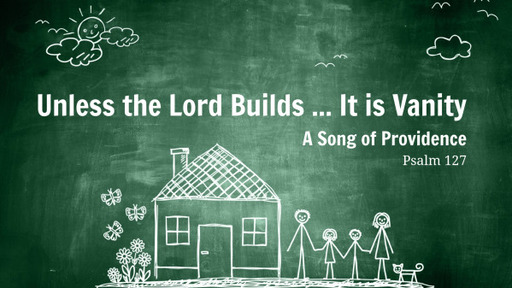Unless the Lord Builds ... It is Vanity: A Song of Providence

Psalm 127 is a pilgrim song about divine providence in domestic activities. The passage focuses on the hidden activity of the LORD in building a house, protecting a city, prospering one’s labor, and providing children for the family. These daily cares of the ancient Israelite were eased by the belief that the LORD was sovereignly working through all the circumstances to bless his people.
As a wisdom psalm its principles would be timeless. It contrasts the blessings of God with the futility of life without God: without God’s blessing all human effort and precautions are in vain
I. The life of vanity (vv. 1-2a)
A. In the home (1a)
The expression build a house may have a double meaning here. It may refer on the surface level to a literal physical structure in which a family lives, but at a deeper, metaphorical level it refers to building, perpetuating, and maintaining a family line.
The word translated “vain” (שָׁוְא) is difficult to translate precisely. “Vain” conveys the idea of empty or futile; the Hebrew word does indeed mean “futile, worthless, meaningless,” but it also means “false.”
Building without faith in and dedication to the LORD is pointless
B. In providing security (1b)
The city symbolizes community security, which is the necessary framework for family security.
Seeking security for something God does not protect is powerless
C. In our work (2a)
A long, industrious day is not wrong. In fact, this is held up as profitable in wisdom literature. But if the food is produced through tiring labor, anxiety, and stress, and the family eats of food so produced, it is a life of fear and worry without trusting the LORD and it is futile. More than that, it is lethal, physically and emotionally, for such anxiety kills the body just as easily as it kills the spirit.
Anxious toiling to earn a living is pointless and powerless
II. The life of blessing (2b-5)
A. God blesses his beloved with sleep (2b)
The word “sleep” would be symbolic (perhaps a metonymy of adjunct or effect), referring both to literal sleep and to what sleep represents, resting in the security, confidence, and satisfaction of knowing that one’s life is in God’s hands. In other words, those who place their complete trust in the LORD may rest assured that he knows their needs and will provide for them, and that agonizing and laboring in fear and anxiety will not get any more done than what he chooses to give. The life of faith is a life that rests in him; it may be diligent and industrious but will be free of the restless anxieties.
A life dependent on the LORD is secure and satisfying
B. God blesses his beloved with offspring (3-5)
Some prefer to translate this term with the gender neutral “children,” but “sons” are plainly in view here, as the following verses make clear. Daughters are certainly wonderful additions to a family, but in ancient Israelite culture sons were the “arrows” that gave a man security in his old age, for they could defend the family interests at the city gate, where the legal and economic issues of the community were settled.
The Israelites saw children as the greatest enrichment God could give their married lives. And in the ancient world where life was fragile and infant mortality high, a child who lived and flourished was something for which the parents would praise God. No devout believer would dare neglect or abuse such a gift from God.
“like arrows in the hand of a warrior, so [are] sons of youth.” Arrows are used in combat to defend oneself against enemies; sons are viewed here as providing social security and protection (see v. 5).
The word “blessed” (אַשְׁרֵי) is frequently translated “happy,” but that does not convey its full meaning. The noun celebrates the benefits of a right relationship with the LORD; it refers to the feeling one has who knows that all is well with God. And since it is a plural in the construct form, it might more accurately be rendered, “O the heavenly bliss (O the blessednesses) of the one whose quiver is full of them.”
Being “put to shame” is here metonymic for being defeated, probably in a legal context, as the reference to the city gate suggests. One could be humiliated (Ps 69:12) or deprived of justice (Amos 5:12) at the gate, but with strong sons to defend the family interests this was less likely to happen.